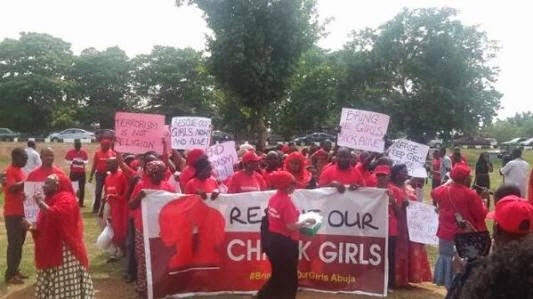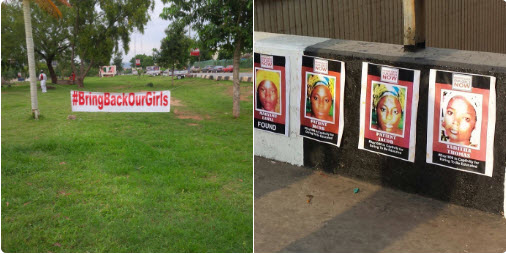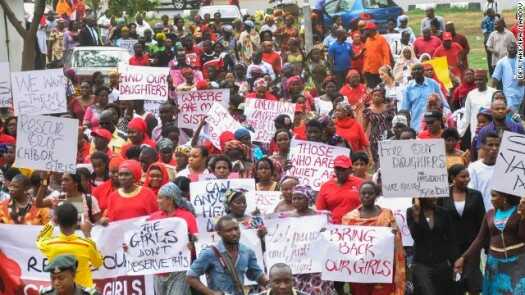The Forever Job
May 28, 2019
Story



"Will they listen? You think?" Maryam asked. "The Presidency."
I was bent over as I tied my shoelace. I had decided against the low-top Converse I had worn earlierand opted instead for a pair of Adidas high-top sneakers. They felt firmer than my previous choice. The colors were a match too; black with red and white highlights.
"I think the question is," I said as I stood up straight, pulled a solid black Tam hat over my twist-out hair and adjusted the brim in the mirror, "will we let them forget?"
I turned around.
"There are many more questions than the one you just asked, Maryam," I said as I held her by the arm and led her towards the door. She was wearing a red hijab on her head. She followed me to the door, observed me curiously, and asked, "Oh?"
Our Indian friend, Lakshmi, opened the door and peeped into the room. She had decided to join the march today before catching her flight back to Germany in two days time. I too would be leaving after the event, if I made it out alive.
"Ready? Let's go, come on," said Lakshmi, as she held the door for us and locked it behind her.
May 1st, 2014. Abuja, Nigeria.
The three of us were doing this for the first time in our lives, marching for women's rights. All three of us had our personal stories about how we too had been deprived and persecuted as a result of our feminity. The #bringbackourgirls March was a necessary experience for us because the kidnap of over 200 Chibok girls touched our core. We could connect with the Chibok girls in very personal ways. By participating in the march, we three could connect deeper with one another as friends from different nationalities and religions but with similar backgrounds. We could connect with other women globally as well asthe girl child. We could connect with the Chibok girls and their grieving parents.
We were nervous, yes.
Anything could go wrong. It was a period of heightened insecurity in Nigeria. Bombs often would go off split seconds apart. Blasts occurred every month, sometimes many times in a single month. Decapitated bodies were at the time almost a daily scene. Many times, a Boko Haram terrorist would dress like the average citizen and blend in with an unsuspecting crowdto carry out his/her monstrous acts. Therefore, it was always advisable to stay away from crowds. But here we were, going to be part of an activistgroup. This particular gathering which we wanted to be a part of drew attention since it spoke directly against what the Boko Haram sect stood for, and so we were all the more nervous being almost confident that it would invoke the rage of the terrorists.
Still, we marched.
I was afraid for my friend, Lakshmi. She was on vacation from Germany, and I wanted her to go back to her family in one piece, not in pieces. We had more than enough bombs going off already, and we would joke that we were protective of her because we didn't want any military retaliation from the Chinese consul or something.Maryam and I made sure we never lost her in the crowd. For her sake, we kept close to the sidelines.
I can still recall the overflow of emotions as we got to the waiting grounds and saw the relatively large crowd. It was averagely largebut bigger than we had expected. The atmosphere was solemn, mournful, but it was a relief to find that it was devoid of any of the gastronomic outrage that typifies a political pressure group (which the BBOG Movement clearly had no intentions of presenting itself to be, anyway).
A woman went round holding out her hat, asking for contributions to the cause. I gave, my two friends gave. Later we found buckets and went round doing same and handing the money over to the organizers of the campaign. We felt useful.
It was all we could do to keep our tears from falling as the march began, the thundering feet determinedly tracing a path to the presidential residence at Aso Rock. The signs held up silently by marchers made it impossible to talk about anything else. Some people spoke but in hushed tones and only about the progress of the march. Some people wore gags to demonstrate a high discipline and a resolve to say nothing discriminatory or inciting. Some (like my two friends and I) were effortlessly speechless.
One thing we did not think to take into consideration was the police.
We never expected that the police would confront us dressed in riot gear. The police were ready to push us back violently, and that alarmed us quite a bit. The law enforcement agents did nothing to defend us against the pro-government thugs that had suddenly emerged, chanting political slogans and pelting us now and then. In defense, the marchers would raise their placards and banners to use them as shields. It was more like we were saying, "Read this again! This cry for help is why you're resisting us. We're not here to antagonize the government. Are you really on democracy's side?"
We felt misunderstood, and the theme of our message despised. It was absurd! It was appalling that anyone would ignore the humanitarian catastrophe at hand, repress the #bringbackourgirls campaign and persecute the campaigners as though they had merely rented a crowd in opposition to the ruling elite.
If that were true, the Movement would have disintegrated after the ruling and incumbent party at the time had been toppled in the elections. But it didn't.
Through it all, however, the crowd remained calm, focusedand non-violent. When the women leaders began to read their speeches using microphones regardless of the disenfranchising attitude of the police, we could no longer hold back our tears. At that moment, the unifying spirit that gripped the marchers was so powerful. Strangers locked eyes hugging each other and wept freely. Over 200 girls kidnapped, hungry, afraid, confused, enslaved, raped, tortured, some sold for pennies, some martyred. We were, we are,their only hope. We werethe girls and their parents.
After the speech, the crowd marched peacefully back to the waiting grounds from which we had set out. Those who came with vehicles offered to drop some off who were going their way. Those who had no vehicles either went home through the public transport system or just decided to walk. We walked, our group getting smaller and smaller as one by one our comrades reached their homes.
Sitting in Maryam's room physically exhausted, we three (grateful to be alive) talked about the day and the future of the BBOG Movement, the Chibok girls, and the #bringbackourgirls hashtag. Maryam's question resurfaced as we talked into the night.
Would the Presidency listen? How was it that the international community displayed more zeal and solidarity than our own? Would the bureaucracy and flamboyant excesses of the officialdom permit them to awaken from their disgraceful complacency and delinquency to the effect that they draw compassion from the wells of their human instincts (at least) to make use of in the actualization ofthe girls' speedy rescue?
It depended on us, the Movement, to form a phalanx that would make things happen.
The encounter with the police already proved the validity of Maryam's question. I reminded my friends that the lawmen's resistance was obviously only the beginning of the opposition that the BBOG Movement must have to overcome to see to it that the Chibok girls were rescued and that value was duly placed on the rights of the girl child. I reminded my friends that the Movement must match the opposition's fury and indifference with civility, respect for authority, discipline and a keen resolve to get the girls rescued. The Movement can only maintain the pressure through subsequent and consistent strategic, creativeand collective civic education and action-taking.
It's the third year since these events shook the world. A few of the girls have been rescued and returned to their parents. Those involved with the BBOG Movement feel crushed in their spirit because this did not happen sooner or in larger numbers. The damage had been done. It is discouraging to see the number of people participating in sit-ins fluctuate or to see the #bringbackourgirls hashtag fade and flicker into a recall that occurs only onannual remembrances. However, this is a feeling that we have to overcome every day to save the very last of the girls. The campaign is still on.
The call to advocate for human rights is a call to theforever jobthat places a demand on our commitment to the cause beyond cliched poetry and the beams of the media spotlights. Indulgence in amnesia is not permissible, for we must not further afflict the afflicted. If we forget, society forgets, the government forgets. When the lights are out, when no one cares, we must still sit in solemn silence, ponder the lessons learned, and create new ways forward. We must engage our minds, engage our wallets, engage the grassroots, engage the afflicted, engage the officials, engage theenemy of the common good. Change never did happen in a single day. Know that it may take weeks and months and years and decades, but get up every day and do it anyway. The real test comes when it looks like we won't win. Will we keep trying? Will we keep sane and civil while we keep working to reason and to explain and to dialogue and to act?
I've signed up for the forever job. Have you?




